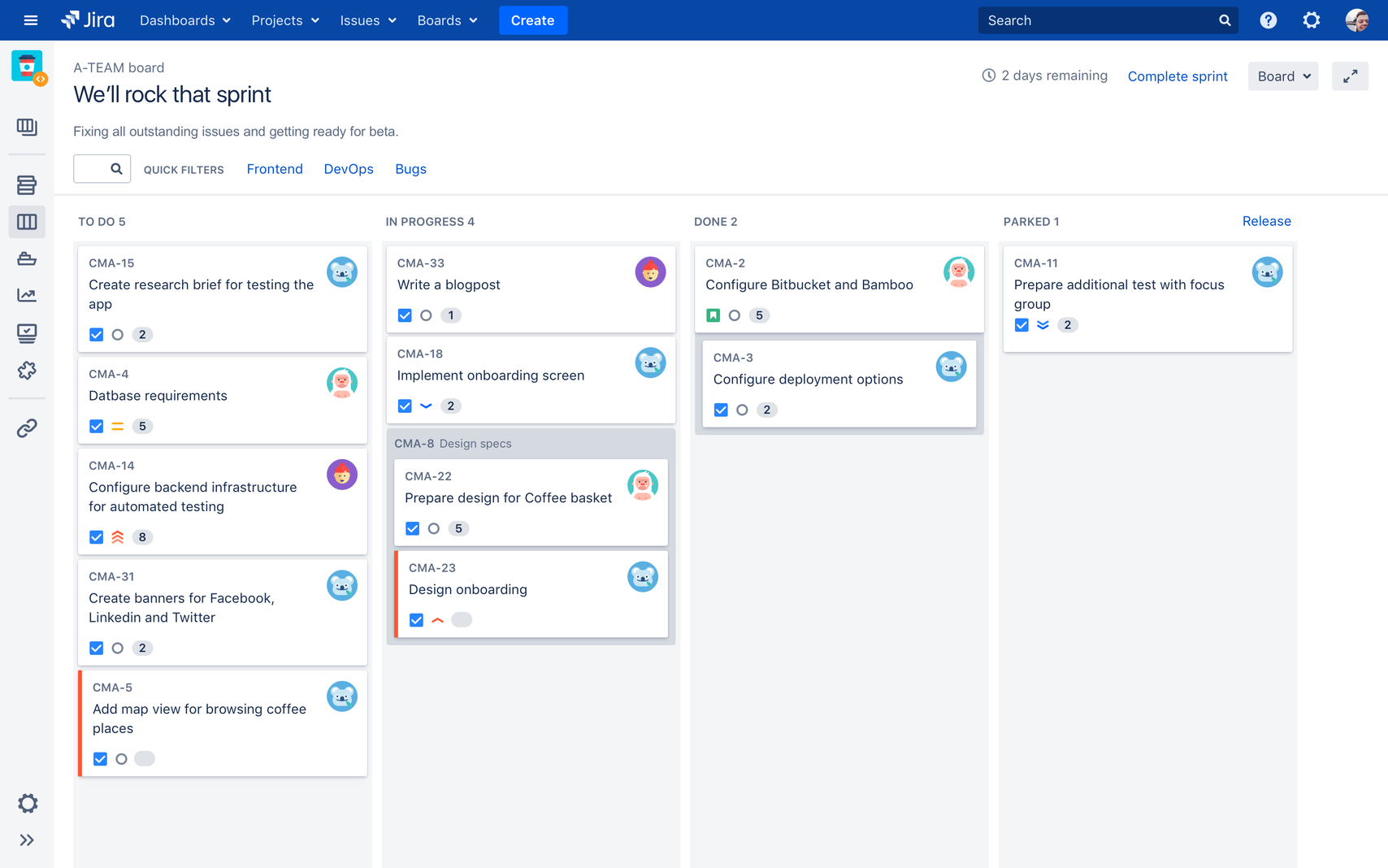Jira Software 8.0.x release notes
11 February 2019
We're pleased to present Jira Software 8.0.Highlights
- Look and feel: Scrum and Kanban
- Better email notifications
- Significant backlogs load faster
- Dropping Linked pages count to boost performance
- New priority icons
- New options in advanced search
- Massive performance improvements
- Faster indexing
- REST API for issue type schemes
- Smaller improvements to make your day
- Bonus resources
- Resolved issues
More
Interested in trying a shiny new version? Don't forget to renew your active software maintenance! Renew now.
Read the upgrade notes for important info about this release and see the full list of issues resolved.
Compatible applications
If you're looking for compatible Jira applications, look no further:
Look and feel: Scrum and Kanban
We’ve started refreshing Jira’s UI some time ago, and Jira 8.0 brings another wave of changes in this area. This time, we’ve focused on improving the Scrum and Kanban boards and backlogs - these are one of the most commonly used views, and we always aim at making your time spent with Jira more enjoyable and productive.
At the same time, we’ve made sure that these changes don’t disrupt existing workflows or apps, or anything that you’re already accustomed to. Go ahead and try Jira 8.0 to see the changes for yourself, we’re pretty sure you'll enjoy them, just as we do!
Better email notifications
With every issue update sent in a separate email, email notifications can get overwhelming. Digging through a pile of emails first thing in the morning is never a good idea, that’s why we’ve embarked on a mission to make notifications smarter, and less chatty.
In Jira 8.0, you can batch events that occur close together, and receive them in a single email. Every email like that groups events that occurred in a single issue within the 10-minute window, and is very helpful when you're doing any bulk updates, or when your teammates create issues and fill them in in one go. Here’s how a summary email looks:
Your Jira admin can enable this feature by going to > System > Batching email notifications. Learn more
Significant backlogs load faster
Big backlogs can take time to load, and teams usually work with a small chunk of the issues at a time. Knowing this and striving to make backlogs render faster, we've changed the default to display only 100 issues (90 from the top and 10 from the bottom) from your backlog. The remaining issues can be displayed if you click Show all issues.
On top of this change, we've introduced a number of backend changes that resulted in faster initial loading. For example, when we tested a backlog of 10K issues, it loaded in 4 secs as opposed to 85 secs in earlier versions of Jira.
Dropping Linked pages count to boost performance
To significantly improve Jira performance, we've decided to drop the count of pages linked to epics and sprints. You can still track linked pages and see if there are multiple pages linked but the exact count in numbers is no longer there.
This change does wonders to Jira performance, so no count no cry in this case.
New priority icons
We’ve got a lot of feedback about our priority icons not being distinctive or accessible, and we have to agree with that. Finally, after countless hours of designing, user testing, and even looking for inspiration in Egyptian hieroglyphs, we’ve decided on a set of simple and clear icons that will make it easier to distinguish what needs to be done first. Here’s a comparison of old and new icons that you'll be seeing around Jira:
New options in advanced search
Here are some new options that you can use when searching for issues with advanced search:
Find authors (updatedBy)
Search for issues that were updated by a specific user, within a specified time range. Whether you're looking for issues updated in the last 8 hours, two months, or between June and September 2017 - we've got you covered. Learn more
Find link types (issueLinkType)
Search for issues that are linked with other issues by particular link types, like blocks or is duplicated by. This will help you quickly find any related blockers, duplicates, and other issues that affect your work. Learn more
Massive performance improvements
Because of the changes and improvements we’ve introduced, Jira 8.0 is significantly faster than the previous versions. It’s not only about faster indexing that you can read about below, but also the most commonly used views, like boards and backlogs.
Here are some sample results that we’ve observed when comparing Jira 8.0 to Jira 7.13 (2 million issues):
- Viewing boards improved by 62% (Data Center: 60%)
- Viewing backlogs improved by 87% (Data Center: 87%)
- Searching with JQL improved by 33% (Data Center: 31%)
- Browsing boards improved by 16% (Data Center: 22%)
- We’ve also observed significant improvements (30 - 50%) when testing a typical action (mean of all actions that we run in our tests) in Jira containing different data sets (increased number of projects, issues, boards, workflows, and so on).
To see all results, go to Performance and scale testing.
Faster indexing
One of the big changes coming in Jira 8.0 is the upgrade of Lucene, Jira’s search-based subsystem engine. Though not visible at first glance like other user features, this change brings significant improvements to indexing, which makes it easier to administer and maintain your Jira instance. Here’s an overview of how this change affects indexing:
- Reindexing Jira takes much less time
Reindex duration is 71% faster (in our tests, a 3h foreground reindex dropped to 53 minutes.) This means less time spent on reindexing after major configuration changes, and quicker upgrades. - Jira indexes are smaller, and easier to maintain
Index size has shrunk by 48% (in our tests, the index size dropped from 19GB to 9.9GB.) This means a faster, more stable Jira that is easier to maintain and troubleshoot. Jira performance is stable over time
No need to reindex often, as performance stays consistent and doesn’t degrade with time.Jira is more stable and predictable
Memory issues that occurred with intensive search functions, like very complex JQLs, are nonexistent in our 8.0 tests.
REST API for issue type schemes
Jira 8.0 brings REST APIs to let you manage issue type schemes outside of the user interface. As a Jira admin, you can perform the following actions:
- Create an issue type scheme and associate it with projects
- Retrieve individual or all issue type schemes, together with the associated projects
- Change or remove projects associated with a scheme
- Delete issue type schemes
For more info, see Issue type schemes in Jira REST API docs.
Small improvements to make your day
4-byte characters
Jira now supports 4-byte characters with MySQL 5.7 and later. This means you can finally use all these emojis you've dreamed about! Here's a guide that will help you connect Jira to a MySQL 5.7 database. You can find more details about this change in this suggestion.
Add-ons are now apps
We're renaming add-ons to apps. This has already changed in our Universal Plugin Manager some time ago, and now Jira follows suit. This change shouldn't really affect you, but we're letting you know so you're not surprised when seeing this new naming in the Jira administration and other pages.
Using sprints when your backlog isn't sorted by rank
The easiest way to move your issues from backlog to one of the sprints is by using drag & drop. This, however, doesn’t work for backlogs that aren’t sorted by rank, effectively making such backlogs very difficult to use. We’ve heard your feedback, and added a way to move your issues to a sprint by right-clicking them, and sending to any sprint you want. More details in this suggestion.
Bonus resources
Performance and scale testing
With every Jira release, we’re publishing a performance and scaling report that compares performance of the current Jira version with the previous one. The report also contains results of how various data dimensions (number of custom fields, issues, projects, and so on) affect Jira, so you can check which of these data dimensions should be limited to give best results when scaling Jira. You can get the report for Jira 8.0 here.
Security overview and advisories
We’ve created a document for system administrators who want to evaluate the security of the Jira application. The document answers a number of questions that commonly come up when customers ask us about the security of our product. It will also list any security advisories published for Jira 8.0. You can view it here.
Jira Software mobile app
We're excited to share that the Jira mobile app beta is up for grabs! You can use the app to view your work on the go and stay up-to-date with anything that’s going on in your projects.
The app is available for iOS and Android. Check out our docs for more info on how to get it up and running.
Pre-upgrade planning page
Now you can plan your next upgrades with a tailored upgrade plan recommended for your instance. It will help you get upgrade-ready by highlighting the important steps you need to follow, populated with up-to-date information that’s specific to your instance and upgrade path.
The pre-upgrade planning page is available not only for Jira 8.0, but also earlier versions (7.4.3+). When you upgrade the Atlassian Troubleshooting and Support Tools app (you can do it from within Jira), this page will appear under > Applications > Plan your upgrade.
Resolved issues
Issues resolved in 8.0.0
Released on 11 February 2019
Issues resolved in 8.0.1
Released on 20 February 2019, removed on 28 February 2019
Jira 8.0.1 has been removed because of this bug.
Issues resolved in 8.0.2
Released on 6 March 2019
Issues resolved in 8.0.3
Released on 9 July 2019







